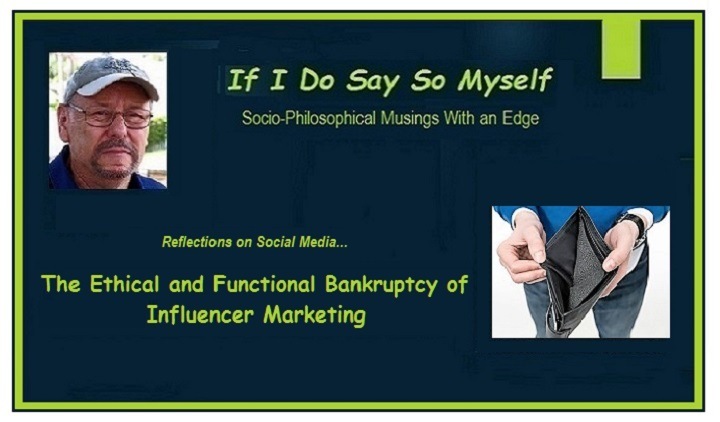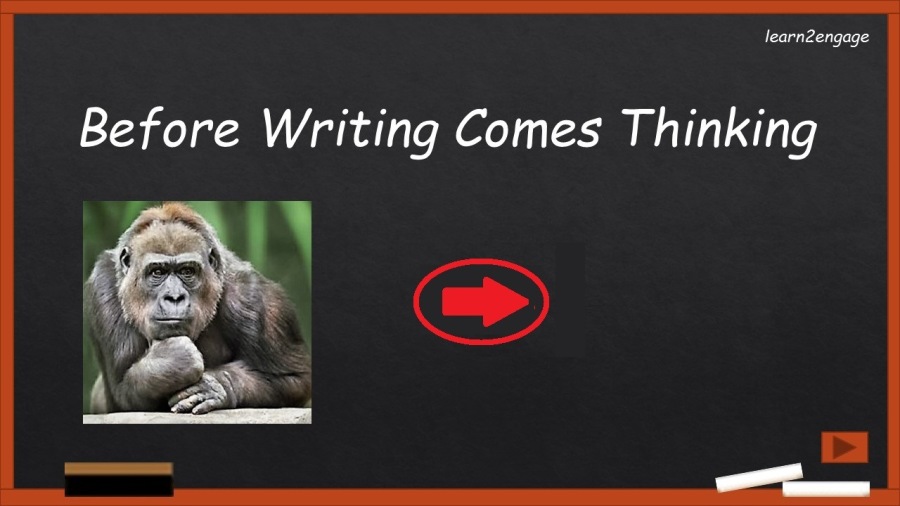The Ethical and Functional Bankruptcy of Influencer Marketing

INFLUENCER MARKETING IS A WRONG-HEADED CONCEPT FOISTED UPON FIRMS LOOKING NAIVELY FOR A FAST, CHEAP PATH TO BRANDING AND SALES...
Preface: This article was inspired by several posts by Dr. Milos Djukic on the subject of Influencer Marketing. Which is not to say the opinions expressed here necessarily represent, in any way, his views. Rather, it is to say that I very much respect his opinions on this topic and in general. And I am grateful for the online exchanges and relationship we've enjoyed over several years since we first became fellow members of Writers 4 Writers on LinkedIn.
As to this post itself, although I've included a few background references for your information, it is not intended to be an academically exhaustive analysis of Influencer Marketing. Instead, it presents some observations which I believe strike to the core both of the concept and practice of Influencer Marketing — somewhere between a rant and a philosophical rumination.
Influencer marketing ... leverages the power of ... social media “influencer[s]” ... to expose a brand or product to the influencer’s large follower base - which can number in the thousands or even millions...
MediaKix.com
So, what's in your marketing wallet?
If what's there consists solely of Influencer Marketing, I gotta tell you, it's not much at all. For this darling of so many social marketers is, I submit, a snare and a delusion — in several significant ways. However, before taking a look at why I believe that to be the case, let's clear up a common confusion.
A distinction is frequently drawn between earned influence and paid influence. [1] The former supposedly grows organically as a result of a product, brand, or firm drawing the attention and endorsement of a number of social media Influencers. The latter is generated by paying for endorsement(s) by such Influencers.
A close look at common and widespread practice discloses that precious little if any earned influencer marketing actually occurs. At least, not if we understand that payment to so-called "social influencers" comes in many different forms, including mutual promotion.
![Payment Accepted by
CHECK [=]
and in Reciprocal Influence Buildin,
MONEY ORDERS](https://contents.bebee.com/users/id/10277593/article/the-ethical-and-functional-bankruptcy-of-influencer-marketing/07a67ed4.png)
And while the endorsement of a firm, brand, product or service by a social media "influencer" is valuable, the benefit to an influencer of being reciprocally promoted by the recipient of an endorsement is often just as valuable, sometimes even more so.
If an endorsement provided by an influencer to a major international brand is promoted in a big-bucks social marketing campaign implemented by the firm whose brand is involved, the Influencer reaps the benefit of exposure to a potentially much larger audience than he or she might have engaged. Which is a clear and identifiable benefit to the Influencer.
The bottom line is that, even in those cases where no cash changes hands for an endorsement, mutual consideration of a significant kind nevertheless passes both ways, albeit within a framework of quid pro quo barter.
Which is why virtually all Influencer Marketing these days is of the paid, not earned variety.
Understanding this is key to grasping how minimal the value of Influencer Marketing really is going forward — notwithstanding the plethora of parroted claims by Social Marketers to the contrary.
According to an AdWeek article published about a year and a half ago, "Consumers are tired of paid ads ... which interrupt ... the consumer experience, [whereas] native advertising places brands and products within the organic content, creating a more pleasurable experience for consumers and a more powerful marketing solution for brands." [2]
To my mind, not much. To the AdWeek author of the article, it no doubt means that consumers (buyers) are weary of being yelled at and lied to in traditional advertising, written by anonymous copywriters. And that consumers are much more amenable these days to being influenced during Engagement on social media with people they have, over a period of time, come to like and trust — and with whom they believe they have a "relationship", albeit a virtual one.
Truth be told, Influencer Marketing is not a revolutionary concept. It is an evolved form of, what we used to call in print media advertising and PR, "independent third-party endorsement" (ITPE).
Back when I was a Senior Editor for a major international yachting magazine, the plum chased by every PR and marketing agency for their clients was an editorial feature with a well known and respected writer or editor endorsing the client's product or brand. The effect of such an editorial endorsement could be seen in a distinct upward blip in sales during 60 to 90 days following publication of the ITPE.
As I see it, the influencing power of the ITPE had its origins in the days when the editorial and advertising arms of a publication were pretty much autonomous and independent from one another. It was a time when editors, particularly in special-interest publications, had "expert" credentials. And, as a result, endorsements enjoyed high credibility with readers. Indeed, it was a time during which it was actually necessary to warn readers not to believe everything they saw in print.
A couple of decades ago, editorial independence from the advertising side of publishing began to wane, particularly in the area of special-interest magazines that covered consumer goods and services. Year by year, more and more, the publishing arm (the ad side) of such magazines began pitching to advertisers the concept of being "partners in marketing". And the spirit of quid pro quo grew ever stronger, as advertisers and their agencies became more brazen in demanding "bonus" editorial coverage (read ITPE) in a not-so-loose exchange of ad dollars for such coverage. Until it became virtually impossible in most consumer special-interest magazines to tell the difference between editorial features and "advertorial" (paid Advertising thinly disguised by format to look like Editorial).
Enter the digital publishing revolution and the rapidly growing popularity of social media...
Digital self-publishing did not in itself cause publishing to suffer Integrity Anemia. But it did almost overnight swell by a hundredfold the numbers of those peddling marketing services in general and Influence Marketing in particular. With the result that the "independent" in ITPE has become as hard to find as the pea in a huckster's shell game.

Truth In Advertising regulations in the U.S. date back more than a century. [3] Yet today, there are firms which sell services involving the writing and posting of positive comments on products and brands, on both sellers' sites and those of reputedly consumer-oriented organizations, without even a nod to concerns about unfounded and potentially misleading statements that may damage those who trust and rely on such comments.
Even more disturbing, today, most of us don't seem to care about or even want to understand the problem. Instead, we choose to dwell in the nether region of Social Media, where system "hacks" are admired and "sharp" practice is lionized. Where Influencer Marketing is seen as a "hack" — a smart shortcut — in the building of product and brand credibility, however much the foundation of such credibility stands on the shifting muck of misrepresentation and outright duplicity.
Superficially, it might seem that contemporary Influencer Marketing is just a natural extension of the Celebrity Endorsement Marketing, so beloved in traditional marketing and advertising... but it is not.
The "rules" of Celebrity Endorsements have always been pretty well known by consumers. Celebrities get paid for endorsing products — big bucks, at that. Consumers generally know that, for example, Michael Jordan wore Nike shoes because he got paid to do so. They just don't care.
![A
PH siogoets]
Em LEE] 2 huencer](https://contents.bebee.com/users/id/10277593/article/the-ethical-and-functional-bankruptcy-of-influencer-marketing/7bea1382.jpg)
They don't care because consumers don't rely on the "expert" independent opinions of celebrity endorsers. To the contrary, they buy an endorsed products because 1) the celebrity endorser represents publicly that he or she uses the product, 2) the celebrity endorser is perceived to be cool, and 3) by buying and using or wearing the celebrity-endorsed product, the consumer feels he or she is cool, as well. It's completely a matter of Coolth by Association.
In other words, Michael Jordon is cool. MJ wears Nikes. Therefore, when I wear Nikes, I am cool, too.
Not so, when it comes to contemporary Influencer Marketing, in which would-be influencers pose as knowledgeable, if not experts relative to that which they are endorsing. And for the most part, downplay and even hide the fact that they are being compensated for their endorsements.
Which, to my mind, is a clear and unmistakable ethical breach. Moreover, it is an ethical shortfall irrespective of the angels-dancing-on-the-head-of-a-pin machinations of those who seek to justify and legitimize such marketing.

A few weeks ago, I was in conversation with a social media Advocate Endorser. Such Advocate Endorsers usually have a lower social media profile (level of notoriety) than so-called Influencers, but they nevertheless publish regularly on social media on behalf of a particular product or brand.
This fellow I spoke to was, in my view, being paid for his endorsement, and I told him so. His argued that he wasn't being paid because he wasn't receiving any compensation at this time. And anyway it didn't matter if he would eventually be paid because he would be endorsing the brand in question, even if he weren't being paid. So, what was the harm, he asked, in eventually collecting compensation for the endorsement?
Well first, being paid or not isn't just about what is changing hands right now. Contingent future compensation is payment, even if it takes place well after the services being purchased are rendered. That is why, for example, in military procurement, personnel are breaking protocols (and the law) if after retirement from the Service, they receive payments or other consideration from vendors in connection with the purchasing decisions they made while performing their procurement duties at an earlier time. Payment is payment, whenever it occurs.
Second, it is irrelevant what one would do "even if one weren't receiving compensation." Years ago, I was running a company that purchased several millions of dollars worth of materials and manufactured goods annually. At one of our locations, we had a purchasing agent whom we discovered had been for several years accepting "gratuities and presents" from vendors. When confronted on the issue, the purchasing agent's defense was that he always secured the best products at the most competitive prices, and so the company never lost on any of his deals. So what was the issue?
Well, the issue is one of integrity — both the substance and the appearance of it.
Compensation is paid in such cases to secure influence and favor. This ipso facto takes such situations beyond the realm of acceptable ethics. [4] And it is never possible to support adequately the claim that the passing of "extra-curricular" compensation did not purchase advantage or compromise best considered independent judgment. And once you compromise the "independent" part of an ITPE, it loses its credibility and value.
In this respect, I believe that we've been operating during a "honeymoon" period for Influencer Marketing, one in which legacy overtones, deriving from the time when ITPE meant something, have persisted. But my, admittedly anecdotal, observation is that the digital marketplace is quickly catching up in its understanding of bull chip marketing "hacks".
Which means that Influencer Marketing is losing credibility at an increasing rate and is quickly approaching the point of functional as well as ethical bankruptcy.
Soon, I submit, the only people who will be clinging to the concept, as it has been and is currently implemented, will be the social marketers who foist it upon their clients because they refuse to give up the quick, the dirty, and the cheap. For as social media matures, its users will inevitably become more discerning and less taken in by shell games.
— Phil Friedman
Postscript: Milos Djukic, some of whose writings on Social Media I referenced at the beginning of this post, distinguishes between organically emerging social media Influencers (true Influencers) and those who are created by arbitrary designation and manipulative self-fulfilling exposure and support of the kind we've seen on platforms such as LinkedIn. To my mind, that distinction brings critical clarity to a subject that is otherwise fraught with misconceptions, misperceptions, and misrepresentations. Hopefully, open discussion of these issues will hasten the overdue demise of Influencer Marketing as we have known it. — PLF
Footnotes:
2. http://www.adweek.com/socialtimes/10-reasons-why-influencer-marketing-is-the-next-big-thing/623407
3. https://www.sba.gov/starting-business/learn-about-business-laws/advertising-marketing-law
4. http://www.lee.edu/purchasing/vendors/code-of-ethics/
Author's Notes: If you found this post interesting and worthwhile, and would like to receive notifications of my writings on a regular basis, click the [FOLLOW] button on my beBee profile. Better yet, elect there to follow my blog by email. As a writer-friend of mine says, you can always change your mind later.
Should you be curious about some of my other writings on social media, you're invited to take a look at the following:
"Time to Break All Connections On Social Media"
As well, feel free to "like" and "share" this post and my other articles — whether on beBee, LinkedIn, Twitter, Facebook, or Google+, provided only that you credit me properly as the author, and include a live link to my original post.
About me, Phil Friedman: With 30 some years background in the marine industry, I've worn numerous hats — as a yacht designer, boat builder, marine operations and business manager, marine industry consultant, marine marketing and communications specialist, yachting magazine writer and editor, yacht surveyor, and marine industry educator. I am also trained and experienced in interest-based negotiation and mediation.
In a previous life, I was formally trained as an academic philosopher and taught logic and philosophy at university.
Before writing comes thinking. ( The optional-to-read pitch) :
As a professional writer, editor, university educator, and speaker, with more than 1,000 print and digital publications, I've recently launched an online program for enhancing your expository writing: learn2engage — With Confidence. My mission is to help writers and would-be writers improve their thought and writing, master the logic of discussion, and strengthen their ability to deal with disagreement... all of which I have found to be natural precursors to improved writing.

For more information, click on the image immediately above. And to schedule an appointment for a free 1/2-hour consult email: info@learn2engage.org. I look forward to speaking with you soon.
Text Copyright 2016 by Phil Friedman — All Rights Reserved
Image Credits: Phil Friedman and Google Images

Articles from Phil Friedman
View blog
SEATTLE YACHTS' RE-INTRODUCTION OF THE LEGENDARY ALASKAN LINE OF TRAWLER-STYLE YACHTS CONTINUES TO A ...

GETTING OUT ON THE WATER IN YACHTS LIKE THE RIVIERA BELIZE 54 IS A TOUGH, GRUELING JOB... BUT SOMEON ...

THE UPDATED AND EXPANDED SECOND EDITION OF THIS WELL-RECEIVED E-BOOK IS NOW AVAILABLE... · More than ...
Related professionals
You may be interested in these jobs
-

Phoenix, AZ Plastic Surgery Opportunity
Found in: Lensa US P 2 C2 - 1 week ago
DOCTORS CHOICE PLACEMENT SERVICES, INC. Phoenix, United StatesPhoenix, AZ Plastic Surgery Opportunity · Join a thriving established Plastic Surgery practice in a superb location near metro Phoenix. · Great schedule/hours = Monday thru Friday, 9am - 5pm · Step into extremely busy cutting edge practice, 2 certified surgery rooms, own vein cl ...
-
Steward (Flexible Shifts)
Found in: beBee S2 US - 1 day ago
DoubleTree by Hilton Hotel Jacksonville Riverfront Jacksonville, United States Full timeFULL TIME - STEWARDING · hos · pi · tal · i · ty (noun): The friendly and generous reception and entertainment of guests, visitors, or strangers. · When you think of home, how do you picture it? Is there a plate of warm baked biscuits in the morning? An ice cold pitcher of sweet ...
-

Shop and Deliver with Instacart
Found in: beBee S2 US - 2 weeks ago
Instacart Shoppers Springfield, United States Part timeFULL-SERVICE SHOPPER · Start earning quickly with a flexible schedule · Shopping with Instacart is more than grocery delivery. Shoppers help make our world go round. They make money, make moves, and make shopping lists come true. They make good time, make life easier, and make pe ...


Comments
Phil Friedman
6 years ago #47
Phil Friedman
7 years ago #46
I agree, Siraj, the number do not tell all, and what proves to be most popular or "trendy" does not determine what is best. Unfortunately, social media deals best with quantitative metrics (numbers), not with qualitative measures. And too many people mistake popularity for quality. Cheers!
Phil Friedman
7 years ago #45
#63 Siraj, thank you for reading nd commenting. I agree that sometimes likes on LinkedIn are purely from courtesy, but then many comments on beBee appear to be just as superficial. It is the nature of the beast, Social Media. I believe, however, that you have always displayed a high degree of insight, never mind any language barriers. And I for one am always pleased to hear from you. Cheers!
Phil Friedman
7 years ago #44
That is a great analogy, @Richard Buse. The problem is that people who take the time and make the effort to accumulate expertise and experience in a given area -- people who are natural influencers -- have at some point the need to monetize those efforts. Unfortunately, too few web users are willing to pay even a dollar or two a year to support objective independent third party reviews. And once any form of compensation from "reviewees" is introduced, objectivity goes out the window. I don't always agree with Consumer Reports, but I trust them to be doing their best to be objective and independent because they donot accept advertising. Thank you for reading and adding to the conversation. Cheers for the holidays and best wishes for a great New Year.
Phil Friedman
7 years ago #43
Thank you, John Vaughan, for saying so. You are correct, of corse. When one shines the light into a dark corner, one sometimes sees thing scurrying about which one would prefer not to see. However, that is the only way to clean out those dark corners. Cheer!
Phil Friedman
7 years ago #42
Robert, my very best to you for the holidays. And please give the Grinch a hug for me. Cheers!
Phil Friedman
7 years ago #41
You see John Vaughan, how irrational the situation is and how futile it is to go where you suggest in the conversation. To wit, someone with absolutely no knowledge of the facts, but only the hope of ingratiating himself with beBee management and consequently being named an Ambassador, comes forward to attack my statements on behalf of beBee, without even waiting for Ambassadors with knowledge of the facts to come forward to say that I'm misstating them. This is the same person who also ridiculously accuses me hijacking the discussion thread of MY OWN post. Put your feet up John, Have a Christmas toddy and a good laugh. My best to you for a merry Chistmas and healthy, happy, and prosperous New Year. Peace.
Phil Friedman
7 years ago #40
You see John Vaughan, how irrational the situation is and how futile tit is o go where you suggest in the conversation. To wit, someone with absolutely no knowledge of the facts, but only the hope of ingratiating himself with beBee management and consequently being named an Ambassador, comes forward to attack my statements on behalf of beBee, without even waiting for Ambassadors with knowledge of the facts to come forward to say that I'm misstating them. This is the same person who also ridiculously accuses me hijacking the discussion thread of MY OWN post. Put your feet up John, Have a Christmas toddy and a good laugh. My best to you for a merry Chistmas and healthy, happy, and prosperous New Year. Peace.
Phil Friedman
7 years ago #39
Phil Friedman
7 years ago #38
John Vaughan > "Can't disagree with your observations in this article, @Phil Friedman. They're on point. Just a little disappointed that they lack 'beBee self-awareness'..." Hmmmm, John, what should I say here? a) If the shoe fits, wear it. b) You can lead a horse to water, but you can't make him scuba dive. 3) If it walks like a duck and quacks like a duck and looks like a duck, then it is a duck. Take you pick. But what is the point of pointing out the blatantly obvious? If those who should exhibit some self-awareness are blinded by visions of candy plums following an IPO or even just plain stubborn refusal to recognize the facts, there is little to be gained by pushing the matter into their respective faces. Cont... Pt II
Phil Friedman
7 years ago #37
John Vaughan - Pt. II -- There are many things I have to say about the Ambassador program but didn't in this article. For example, that there is a sub-rosa cabal within its ranks that wants to force all discussion into a "positive" mode, and which mounted a secret attack on me for my alleged "negativity" and alleged propensity to drive people away from the platform. Never mind that there are numerous documentable examples of users who have come to the platform on the basis of my recommendations in various of my published articles on LinkedIn and the appearance of some of my more popular beBee pieces there. Never mind that my record of engagement in my published work is strong and speaks for itself. And never mind that not one of these Ambassadors has come forward to document a single instance of where my comments to anyone were other than civil and polite. Indeed, so vicious and unfounded was the attack mounted behind "closed doors" that at least two Ambassadors. whose writings are quite popular, resigned from the program in protest and several more contacted me privately to say they were considering doing likewise. (I did my utmost to convince them not to do so, for this should not be about me personally, but about beBee and its future. And their sobering influence is badly needed.) So John, what point is there talking to a wall. Those who read this piece can draw their own conclusions, don't you think? Cheers.
Harvey Lloyd
7 years ago #36
Well i don't think we have reached the Sodom and Gomorrah status yet with Social Media, maybe Ecclesiastes. Thanks for the post and comments you bring interesting topics fore discussion. Have wonderful season and Happy New Year.
Phil Friedman
7 years ago #35
Thank you, Joseph, for reading and commenting. I agree that those who control the ad dollars set the tone. But it is in what they accept, nor necessarily in what they set out to do. I believe that too may ad buyers themselves buy the B.S. that marketers throw at them in terms of the hacks and shortcuts to brand building and sales. The advertising pros among us (e.g. Jim Murray) are invited to correct me if they wish, but my experience is that too often the primary goal of a marketing and advertising firm is to sell the client on the advertising, not necessarily to sell the client's product or brand to consumers. Cheers!
Graham🐝 Edwards
7 years ago #34
Happy Holidays Phil Friedman.
Phil Friedman
7 years ago #33
— Robert, you could not be more correct about the attempt these days, particularly in "Social Marketing" to substitute appearance for substance. And you are spot on when you mention CRM (Customer Relations Management), in which the prevailing attitude is that communicating with and stroking the customer, preferably with auto-responders, can take the place of actually delivering the goods and services sold and for which payment has been received. The telltale is the emphasis on customer relations management, with never even a nod to genuine customer service. ( https://www.bebee.com/producer/@friedman-phil/customer-relations-management-versus-customer-service ) You also make a strong point about one of the most prominent misrepresentations in the world of digital self-publishing, the Amazon "Best Selling Author" designation. Not to long ago, I read a great article that documented how the author published a one-page phantom book under his dog's byline, then spent less than $10 and fifteen minutes securing for his dog the Amazon Best Selling Author rating. There may be some few Amazon authors who are entitled to the designation, but it appears that in most cases it is pure B.S. that grows out of the current ethos in which appearance is everything and substance counts for nothing in the minds of so many who roam the nether world of digital marketing. Indeed, I am aware of at least one writer who purports to be an "Amazon Best Selling Author" and who was not too long ago advertising many of his books at $0.01 — no doubt to bolster his "sales" numbers and continue the fabrication of how successful his published works are. Thank you for reading and commenting. Always good to have you join the conversation. My best to you for a happy holiday season and a healthy and prosperous New Year. Cheers!
Phil Friedman
7 years ago #32
Robert, you could not be more correct about the attempt these days, particularly in "Social Marketing" to substitute appearance for substance. And you are spot on when you mention CRM (Customer Relations Management), in which the prevailing attitude is that communicating with and stroking the customer, preferably with auto-responders, can take the place of actually delivering the goods and services sold and for which payment has been received. The telltale is the emphasis on customer relations management, with never even a nod to genuine customer service. ( https://www.bebee.com/producer/@friedman-phil/customer-relations-management-versus-customer-service ) You also make a strong point about one of the most prominent misrepresentations in the world of digital self-publishing, the Amazon "Best Selling Author" designation. Not to long ago, I read a great article that documented how the author published a one-page phantom book under his dog's byline, the spent less than $10 and fifteen minutes securing for his dog the Amazon Best Selling Author rating. There may be some few Amazon authors who are entitled to the designation, but it appears that in most cases it is pure B.S. that grows out of the current ethos in which appearance is everything and substance counts for nothing in the minds of so many who roam the nether world of digital marketing. Thank you for reading and commenting. Always good to have you join the conversation. My best to you for a happy holiday season and a healthy and prosperous New Year. Cheers!
Phil Friedman
7 years ago #31
Phil Friedman
7 years ago #30
To my mind (what little of it that is left), Ali, you are correct. The problem is that if some few urinate on the seeds, many others are ultimately affected. So it pay to be wary of the produce that is being brought to market... Or something like that. Thank you for joining the conversation. My best to you for the holiday season and the coming New Year. Cheers!
Phil Friedman
7 years ago #29
Thank you, Harvey, for reading and commenting. I am personally not a strong fan of biblical similes unless the comparison is between the digital world of social media and Sodom and Gomorrah. Nevertheless, I agree with you that those who take marketing shortcuts will eventually realize returns commensurate with their investment in integrity. My best to you for the holidays and the coming New Year. Cheers!
Robert Cormack
7 years ago #28
Harvey Lloyd
7 years ago #27
The metaphor is a deep one. Surely the seeds quality is important. One thing that is always key though is the harvest. Without the harvest the effort/seed can not be measured. Technology seems in some cases, in creation and use, have no harvest or maybe a harvest that is difficult to measure beyond the nebulous. Influence marketing seems to be one of these nebulous aspects of technology. IMHO.
Ali Anani
7 years ago #26
The quality of seeds shall also determine the quality of harvest.
Harvey Lloyd
7 years ago #25
No better metaphor exists than the farmer and the seed. Surely influence marketing is the seed that everyone suggests that it is????? Technology and sheer big data, points towards a great harvest. One thing i have recognized about social media is that seed planting is always hyped and suggested because you plant you harvest. I sense that the portion of harvested seeds are smaller than the hype. Very few seem to harvest the level of planting, influence marketing promises. Influence marketing may assist in branding and directing folks towards a brand but the harvest is yet to come. The brand now has to perform or fertilize/weed if we continue the metaphor before the harvest. This is where influence ends and performance begins. I find that in most cases, as i sense many more also do, marketing has over run engineering. In small business this is a death call. Apathy is building in this tool of branding.
Phil Friedman
7 years ago #24
Phil Friedman
7 years ago #23
I agree, Renee, in the main. The best form of endorsement is by users who are pleased with and recommend a firm's product(s) or service(s). And although most customers and clients are not celebrities, that accretion of honest endorsement is the surest way to build a stable customer or client base. Unfortunately, that requires two things that many are not prepared to provide: 1) a quality product or service that offers fair value, and 2) time. Many marketers play on the impatience of a client firm to romance them with promises of hacks and shortcuts. Which is where "Influencer Marketing" comes.in. It's pretty obvious by now that some people just refuse to recognize the fact some "social marketer" have created a concept, Influencer Marketing, that involves hiring certain non-celebrity people who are active on social media and who have followers in the tens of thousands and sometimes in the hundreds of thousands, whom they influence with their opinions. The social marketers in question argue, for example, that a quick way to build profile in the market (branding) is to employ these non-celebrity Influencers to talk about and "recommend" the product or firm in ostensible ITPEs. As I say several times in this post, I personally think it is a pile of bull chips because the idea that you can fool all of the market all of the times is ridiculous, at least in the long run. I think we pretty much agree on this. Thank you for reading and commenting. Best wishes for a happy holiday season and for a healthy, prosperous New Year.
Phil Friedman
7 years ago #22
#7 #9 #10 #18 For the record, and to keep the conversation on point, the following is from the body of this post: "Superficially, it might seem that contemporary Influencer Marketing is just a natural extension of the Celebrity Endorsement Marketing, so beloved in traditional marketing and advertising... but it is not." My distinction between Celebrity Endorsement and Influencer Marketing is not arbitrary. Influencer Marketing has been well defined by "social" marketing professionals, in dozens of industry-related articles. I begin this post by quoting one of them. It baffles me why some people (not you guys) persist in attempts to confuse the discussion by creating a straw-man thesis against which to argue. Thank you for your valued on-point contributions to the discussion. Cheers!
Jim Murray
7 years ago #21
Sorry Wayne Yoshida I can't take credit for that. But I also can't tell you who come up with it originally
Jim Murray
7 years ago #20
That used to be true. But these days the advertising business is in the hands of millennials, most of whom either have their heads up their asses or are busy obsessing over what all the other millennials are up to. They couldn't gauge the tenor of the times if somebody shot it at them from a 50 Calibre Turret gun.
Phil Friedman
7 years ago #19
I love it, Wayne, when Jim Murray says things like that because it makes me feel young again. Of course, bullshit baffles brains only when brains are lazy or naive. Or when the brains belong to a bullshitter. For the easiest person to BS is a BS-er. Cheers!
Phil Friedman
7 years ago #18
#18 Thank you,Graham, for adding you significantly more than two-cents here. It is always good to here from someone with as much real business experience as you have. Everyone is welcome to post their on-topic opinions on my posts, although I do not see that such things as being a career goverment employee qualifies one as an expert in business or marketing. I agree with you that a facet of social marketing and social markets -- if there is such a thing as the latter -- is an ethos of instant success and a failure to distinguish BS from reality. There was a time when customers and clients wanted to come to your place of business at least once to see that you were a serious player. And we're not content to deal with a URL and a stock photo of some generic office or building. To my mind Influencer Marketing works when the market is sufficiently immature and ignorant to accept unsupported claims for reality. Cheers!
Phil Friedman
7 years ago #17
It is reassuring to hear that, Javier, because that means beBee is associating itself with Organically emerging Influencers -- to my mind, the correct path if the goal is stable growth. Thank you for joining the conversation.
Phil Friedman
7 years ago #16
Lloyd, I agree that Influencer Marketing has enjoyed a few years honeymoon in the markets it targets. What I am saying is that, as those markets mature, it is bound to lose its effectiveness as its duplicity and misrepresentation are exposed. Thank you for reading and joining the conversation. Always good to hear from you.
Phil Friedman
7 years ago #15
thank you, Aurorasa, for reading and commenting. I am not sure on what basis you identify Influencer Marketing with Affiliate Marketing. As the former generally carries with it some suggestion of expertise or wisdom, and hides the fact that, in the main, it is compensated. In contrast, the latter generally makes no pretense to special knowledge or experience, and is fairly open about mutual consideration passing. Influencer marketing is what very likely brought you to a crappy email marketing service, thinking that it had been honestly recommended by people who were experienced and who themselves used MailCrap or whatever it's name is. C'nest pas?
Graham🐝 Edwards
7 years ago #14
Just so I'm clear Robert Bacal you are advocating two talk shows and a reality TV show for building a successful business that drives a reoccurring customer base and revenue stream. In my humble experience, barring the one off examples, creating a business, brand and customers is hard work and not the result of celebrity endorsement. There are a awful lot of people who have no idea who Oprah, Ellen and Kevin O'Leary are. Oh and for clarification, the humble experience I refer to is 30 years in Sales and marketing leadership, hiring and managing dozens and dozens of sales and marketing professionals, as well as directly or indirectly generating 10's of millions of dollars in profitable dollars. Let's agree to disagree but if you would like to continue playing this game... punt the ball is in your end.
Wayne Yoshida
7 years ago #13
"Bullshit baffles brains" - awesome quote by Jim Murray
Graham🐝 Edwards
7 years ago #12
Phil Friedman
7 years ago #11
I don't doubt for an instant, Paul, that good advertising influences consumers. However, "Influencer Marketing" is a defined approach that is itself marketed these days advertising and marketing clients. And it is that approach which I am saying is bankrupt. Thanks for reading and commenting. I am pleased you found the beef in then"hamburger" of my post. Cheers and best wishes for a good holiday season and a happy new year.
Phil Friedman
7 years ago #10
Thanks, Jimbo, for reading and commenting — especially because your credentials and experience in advertising are impeccable. And the fact is that marketing and advertising are closely and inextricably connected. In "traditional" advertising, there has almost always existed a tension between needing to say something that catches the attention of the target audience and trying to avoid speaking pure B.S. The waxing and waning of sophistication in the target audience often determines the tenor of the times in Advertising... don't you think? Cheers!
Javier Cámara-Rica 🐝🇪🇸
7 years ago #9
Harvey Lloyd
7 years ago #8
Paul Walters
7 years ago #7
Bravo Jim !!!!!
Paul Walters
7 years ago #6
Jim Murray
7 years ago #5
Phil Friedman
7 years ago #4
#3 Wayne, you are correct. "Payment is payment ...." and that's all there is to it. Anyone who takes consideration (payment) from a firm or its agency to endorse the firm's product or brand, cannot honestly say her or she is being objective. And we all know that -- otherwise, why would such Social Media Influencers hide the fact that they are being paid? Thanks for reading and commenting. Cheers!
Wayne Yoshida
7 years ago #3
Wayne Yoshida
7 years ago #2
Phil Friedman
7 years ago #1